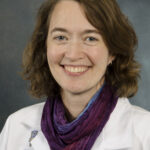ORLANDO, FLORIDA—During the ACR Education Exchange 2023 session, Updates from the Committee on Training & Workforce Issues (COTW), Committee Chair Bethany Marston, MD, associate professor, Departments of Pediatrics and Medicine, University of Rochester, N.Y., began by discussing scholarships for fellows in training (FIT) that will give much needed support to many trainees across the country.
Educational Support for Fellows
The ACR has committed to covering registration fees for ACR Convergence and other ACR events for the next three years for all FIT members based on certain criteria.
For ACR Convergence, senior fellows (meaning second- and third-year adult fellows, third-year pediatric fellows, and third- and fourth-year medicine-pediatrics [med-peds] fellows) will have registration fees fully covered once during their fellowship.
For the ACR Education Exchange/State-of-the-Art Clinical Symposium (SOTA), first-year fellows in adult, pediatric and med-peds rheumatology fellowship training programs will have registration fees covered.
For the Pediatric Rheumatology Symposium (PRSYM), pediatric and med-peds fellows will have registration fees covered once during their fellowship; the meeting occurs every three years.
These scholarships will not cover travel expenses, but the COTW hopes to work on that in coming years.
Subcommittees & More
Dr. Marston also discussed the work of the FIT Subcommittee, currently chaired by Didem Saygin, MD, assistant professor of medicine, Division of Rheumatology and Clinical Immunology, University of Pittsburgh. The subcommittee consists of 10 fellow members, and its goals are to organize the fellows’ educational sessions at SOTA and ACR Convergence, influence FIT volunteer opportunities and enhance FIT educational resources.
The call for applications for the subcommittee opens each year in August, and interested fellows are encouraged to apply.
Among the subcommittee’s many activities this year was the creation of a welcome packet to be mailed to each incoming fellow during the summer.
With respect to the In-Training Examination Task Force, co-chaired by Megan L. Krause, MD, assistant professor, allergy, clinical immunology and rheumatology, University of Kansas Medical Center, Kansas City, and David Leverenz, MD, assistant professor of medicine, Division of Rheumatology and Immunology, Duke University School of Medicine, Durham, N.C., the statistics look excellent in terms of participation. In 2023, 576 FITs took the exam across 136 medical institutions in the U.S., Canada, the United Arab Emirates, Kuwait and Singapore. Scores have been released, and final dates and registration fees for the 2024 exam are to be determined.
The purpose of the In-Training Examination is to serve as a tool for feedback and seek to identify strengths and weaknesses in content knowledge among individual FITs and in curricula across many training programs. This feedback can then be reviewed by fellowship program directors, who can meet one on one with fellows to discuss areas for potential growth and the creation of study plans and self-directed learning that will ultimately increase the chances of passing the American Board of Internal Medicine (ABIM) Rheumatology Board Certification Exam.



